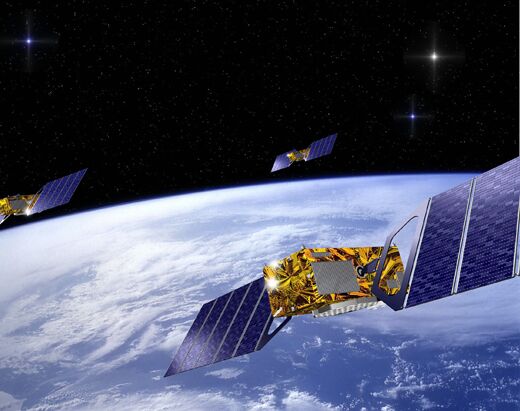
Europe’s Galileo Supported by Military
Europe’s struggling Galileo satellite project may have found its savior: the Continent’s militaries. Modeled after the gps system in the United States, Galileo was supposed to be up and beaming in 2008, fulfilling its purpose as a solely civilian system. Owing to funding woes, however, the due date for an operational Galileo is now 2012, and instead of just helping find package trucks, it could be guiding cruise missiles.
According to Spiegel Online, Galileo may take on a more openly militaristic face. The ground rules for the Galileo project originally stated it would be for strictly non-military use. Few experts believed Galileo’s projected capabilities reflected purely commercial ambitions, but if the system is truly for civilian use only, one might assume it would be at least partially funded by civilian companies.
It is not.
America’s gps already provides sufficient service to Europeans for free. So naturally, the Continent’s private sector is not investing in a clone of what already exists, with no hope of a profit. Yet the EU continues to push Galileo. Why?
The Register explains, “Galileo only makes sense in the context of European military action and infrastructure security, independent of the U.S.” However, passing off the system as a military project in its beginning stages would have launched zero satellites. “Defining Galileo as a civilian system for Europe was the only way to convince all parties involved to agree to the project in the first place,” said Spiegel Online (June 7).
Now that private investing has foundered, the European Commission has taken control of the Galileo project. “European taxpayers will now have to provide the necessary funding. The EU Commission predicts a price tag of €10 billion between now and 2030. This is such a significant sum that tapping into defense budgets suddenly becomes an option” (ibid.).
Of course, the defense ministries will want a return on their money.
From drones flown by remote to troop movements to precision missile strikes, more militaries rely on satellite information today than ever before. While the U.S. allows military use of gps for its allies, including Europe, the bottom line remains the same: gps is owned and operated by Washington. A functional Galileo would enable Europe to stand on its own in times of war.
Competition for independent satellite networks is heating up between the U.S., Russia, China and Europe. If Galileo doesn’t become a reality soon, then Europe will fall behind in the battle for space and therefore the battle for influence. EU leaders believe that for Europe to have a major role on the world stage, the Continent needs its own satellite network for peace and war. They know the next war will be largely decided by dominating space.
Though this purpose was veiled at the project’s inception, Galileo is now emerging as a war machine.
